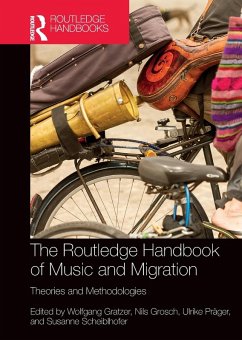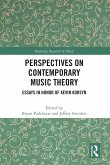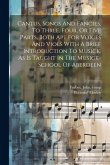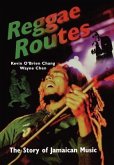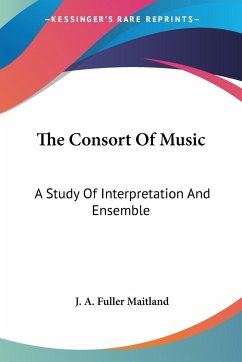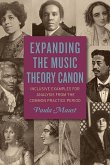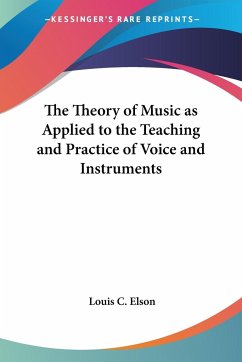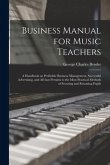The Routledge Handbook of Music and Migration
Theories and Methodologies
Herausgeber: Gratzer, Wolfgang; Präger, Ulrike; Grosch, Nils
The Routledge Handbook of Music and Migration
Theories and Methodologies
Herausgeber: Gratzer, Wolfgang; Präger, Ulrike; Grosch, Nils
- Broschiertes Buch
- Merkliste
- Auf die Merkliste
- Bewerten Bewerten
- Teilen
- Produkt teilen
- Produkterinnerung
- Produkterinnerung
The Routledge Handbook of Music and Migration: Theories and Methodologies is a progressive, transdisciplinary paradigm-shifting core text for music and migration studies. It foregrounds the mobile potentials of music and presents key arguments about why musical expressions matter in the discussion of migration politics.
Andere Kunden interessierten sich auch für
![Perspectives on Contemporary Music Theory Perspectives on Contemporary Music Theory]() Perspectives on Contemporary Music Theory56,99 €
Perspectives on Contemporary Music Theory56,99 €![Cantus, Songs And Fancies, To Three, Four, Or Five Parts, Both Apt For Voices And Viols With A Brief Introduction To Musick. As Is Taught In The Music Cantus, Songs And Fancies, To Three, Four, Or Five Parts, Both Apt For Voices And Viols With A Brief Introduction To Musick. As Is Taught In The Music]() Thomas MorleyCantus, Songs And Fancies, To Three, Four, Or Five Parts, Both Apt For Voices And Viols With A Brief Introduction To Musick. As Is Taught In The Music20,99 €
Thomas MorleyCantus, Songs And Fancies, To Three, Four, Or Five Parts, Both Apt For Voices And Viols With A Brief Introduction To Musick. As Is Taught In The Music20,99 €![Reggae Routes: The Story of Jamaican Music Reggae Routes: The Story of Jamaican Music]() Kevin O'Brien ChangReggae Routes: The Story of Jamaican Music25,99 €
Kevin O'Brien ChangReggae Routes: The Story of Jamaican Music25,99 €![The Consort Of Music The Consort Of Music]() J. A. Fuller MaitlandThe Consort Of Music19,99 €
J. A. Fuller MaitlandThe Consort Of Music19,99 €![Expanding the Music Theory Canon Expanding the Music Theory Canon]() Paula MaustExpanding the Music Theory Canon47,99 €
Paula MaustExpanding the Music Theory Canon47,99 €![The Theory of Music as Applied to the Teaching and Practice of Voice and Instruments The Theory of Music as Applied to the Teaching and Practice of Voice and Instruments]() Louis C. ElsonThe Theory of Music as Applied to the Teaching and Practice of Voice and Instruments18,99 €
Louis C. ElsonThe Theory of Music as Applied to the Teaching and Practice of Voice and Instruments18,99 €![Business Manual for Music Teachers: a Handbook on Profitable Business Management, Successful Advertising, and All That Pertains to the Most Practical Business Manual for Music Teachers: a Handbook on Profitable Business Management, Successful Advertising, and All That Pertains to the Most Practical]() George Charles BenderBusiness Manual for Music Teachers: a Handbook on Profitable Business Management, Successful Advertising, and All That Pertains to the Most Practical17,99 €
George Charles BenderBusiness Manual for Music Teachers: a Handbook on Profitable Business Management, Successful Advertising, and All That Pertains to the Most Practical17,99 €-
-
-
The Routledge Handbook of Music and Migration: Theories and Methodologies is a progressive, transdisciplinary paradigm-shifting core text for music and migration studies. It foregrounds the mobile potentials of music and presents key arguments about why musical expressions matter in the discussion of migration politics.
Produktdetails
- Produktdetails
- Verlag: Routledge
- Seitenzahl: 578
- Erscheinungstermin: 27. Mai 2025
- Englisch
- Abmessung: 170mm x 240mm x 29mm
- Gewicht: 950g
- ISBN-13: 9781032313740
- ISBN-10: 1032313749
- Artikelnr.: 73872072
- Herstellerkennzeichnung
- Libri GmbH
- Europaallee 1
- 36244 Bad Hersfeld
- gpsr@libri.de
- Verlag: Routledge
- Seitenzahl: 578
- Erscheinungstermin: 27. Mai 2025
- Englisch
- Abmessung: 170mm x 240mm x 29mm
- Gewicht: 950g
- ISBN-13: 9781032313740
- ISBN-10: 1032313749
- Artikelnr.: 73872072
- Herstellerkennzeichnung
- Libri GmbH
- Europaallee 1
- 36244 Bad Hersfeld
- gpsr@libri.de
Wolfgang Gratzer is an Austrian musicologist and Professor of Musicology at the University Mozarteum Salzburg, Austria. Nils Grosch is Professor of Musicology and Head of the Department of Art, Music, and Dance Studies and the Research Center for Musical Theater at the University of Salzburg, Austria. Ulrike Präger is Assistant Professor of Music at the University of Louisville, US. Susanne Scheiblhofer is a researcher and instructor at the University of Salzburg, Austria.
1. Introduction
2. Key Terms
3. THEORETICAL AND METHODOLOGICAL APPROACHES TO MUSIC AND MIGRATION
3.1 Enacting and Embodying Mobile Voices: "Musicking as a Tool for
(Ethnographic) Migration Research
3.2 Multi-Perspective Research in Musical Migration Contexts
3.3 Musicological Research with Refugees: Theoretical and Ethical
Considerations
3.4 Musical Ethnography: Researching and Representing Migration, Expressive
Culture, and Politics of Belonging
3.5 Polyphonic History: On Histoire Croisée as a Method of Musicological
Exile and Migration Research
4. MOBILITY IMPULSES AND KINETIC MOMENTUMS
4.1 Music and Cultural Mobility
4.2 Music and Urban Migration: The City, Mobile Ethnography and Affective
Citizenship
4.3 Between "Return Mobilities" and the Hope for an End to Exile:
Musicology and Remigration Research
5. AFTER MIGRATION: INTERACTION, INCLUSION, AND PARTICIPATION
5.1 Music Making by Migrants from the Perspective of Sociological
Integration Studies
5.2 Displaced Humanity on the Move: Rights, Needs, and Future Directions
for Music
5.3 Musical Activities in the Acculturation Processes of Children and
Adolescents with Migration Experiences
6. POSTCOLONIAL AND TRANSCULTURAL PERSPECTIVES ON MUSIC AND MIGRATION
6.1 Perpetual Transformation: Translating Music into New Spaces
6.2 Media, Migration, and Music: Methodological and Theoretical
Perspectives
6.3 Writing for Change: Critical Perspectives in Artistic and Scholarly
Practices as Calls to Action
6.4 Music - Gender - Migration: Topics, Research Fields, and Methods
6.5 Music and Entrepreneurship: Perspectives from Migrant Business Research
2. Key Terms
3. THEORETICAL AND METHODOLOGICAL APPROACHES TO MUSIC AND MIGRATION
3.1 Enacting and Embodying Mobile Voices: "Musicking as a Tool for
(Ethnographic) Migration Research
3.2 Multi-Perspective Research in Musical Migration Contexts
3.3 Musicological Research with Refugees: Theoretical and Ethical
Considerations
3.4 Musical Ethnography: Researching and Representing Migration, Expressive
Culture, and Politics of Belonging
3.5 Polyphonic History: On Histoire Croisée as a Method of Musicological
Exile and Migration Research
4. MOBILITY IMPULSES AND KINETIC MOMENTUMS
4.1 Music and Cultural Mobility
4.2 Music and Urban Migration: The City, Mobile Ethnography and Affective
Citizenship
4.3 Between "Return Mobilities" and the Hope for an End to Exile:
Musicology and Remigration Research
5. AFTER MIGRATION: INTERACTION, INCLUSION, AND PARTICIPATION
5.1 Music Making by Migrants from the Perspective of Sociological
Integration Studies
5.2 Displaced Humanity on the Move: Rights, Needs, and Future Directions
for Music
5.3 Musical Activities in the Acculturation Processes of Children and
Adolescents with Migration Experiences
6. POSTCOLONIAL AND TRANSCULTURAL PERSPECTIVES ON MUSIC AND MIGRATION
6.1 Perpetual Transformation: Translating Music into New Spaces
6.2 Media, Migration, and Music: Methodological and Theoretical
Perspectives
6.3 Writing for Change: Critical Perspectives in Artistic and Scholarly
Practices as Calls to Action
6.4 Music - Gender - Migration: Topics, Research Fields, and Methods
6.5 Music and Entrepreneurship: Perspectives from Migrant Business Research
1. Introduction
2. Key Terms
3. THEORETICAL AND METHODOLOGICAL APPROACHES TO MUSIC AND MIGRATION
3.1 Enacting and Embodying Mobile Voices: "Musicking as a Tool for
(Ethnographic) Migration Research
3.2 Multi-Perspective Research in Musical Migration Contexts
3.3 Musicological Research with Refugees: Theoretical and Ethical
Considerations
3.4 Musical Ethnography: Researching and Representing Migration, Expressive
Culture, and Politics of Belonging
3.5 Polyphonic History: On Histoire Croisée as a Method of Musicological
Exile and Migration Research
4. MOBILITY IMPULSES AND KINETIC MOMENTUMS
4.1 Music and Cultural Mobility
4.2 Music and Urban Migration: The City, Mobile Ethnography and Affective
Citizenship
4.3 Between "Return Mobilities" and the Hope for an End to Exile:
Musicology and Remigration Research
5. AFTER MIGRATION: INTERACTION, INCLUSION, AND PARTICIPATION
5.1 Music Making by Migrants from the Perspective of Sociological
Integration Studies
5.2 Displaced Humanity on the Move: Rights, Needs, and Future Directions
for Music
5.3 Musical Activities in the Acculturation Processes of Children and
Adolescents with Migration Experiences
6. POSTCOLONIAL AND TRANSCULTURAL PERSPECTIVES ON MUSIC AND MIGRATION
6.1 Perpetual Transformation: Translating Music into New Spaces
6.2 Media, Migration, and Music: Methodological and Theoretical
Perspectives
6.3 Writing for Change: Critical Perspectives in Artistic and Scholarly
Practices as Calls to Action
6.4 Music - Gender - Migration: Topics, Research Fields, and Methods
6.5 Music and Entrepreneurship: Perspectives from Migrant Business Research
2. Key Terms
3. THEORETICAL AND METHODOLOGICAL APPROACHES TO MUSIC AND MIGRATION
3.1 Enacting and Embodying Mobile Voices: "Musicking as a Tool for
(Ethnographic) Migration Research
3.2 Multi-Perspective Research in Musical Migration Contexts
3.3 Musicological Research with Refugees: Theoretical and Ethical
Considerations
3.4 Musical Ethnography: Researching and Representing Migration, Expressive
Culture, and Politics of Belonging
3.5 Polyphonic History: On Histoire Croisée as a Method of Musicological
Exile and Migration Research
4. MOBILITY IMPULSES AND KINETIC MOMENTUMS
4.1 Music and Cultural Mobility
4.2 Music and Urban Migration: The City, Mobile Ethnography and Affective
Citizenship
4.3 Between "Return Mobilities" and the Hope for an End to Exile:
Musicology and Remigration Research
5. AFTER MIGRATION: INTERACTION, INCLUSION, AND PARTICIPATION
5.1 Music Making by Migrants from the Perspective of Sociological
Integration Studies
5.2 Displaced Humanity on the Move: Rights, Needs, and Future Directions
for Music
5.3 Musical Activities in the Acculturation Processes of Children and
Adolescents with Migration Experiences
6. POSTCOLONIAL AND TRANSCULTURAL PERSPECTIVES ON MUSIC AND MIGRATION
6.1 Perpetual Transformation: Translating Music into New Spaces
6.2 Media, Migration, and Music: Methodological and Theoretical
Perspectives
6.3 Writing for Change: Critical Perspectives in Artistic and Scholarly
Practices as Calls to Action
6.4 Music - Gender - Migration: Topics, Research Fields, and Methods
6.5 Music and Entrepreneurship: Perspectives from Migrant Business Research

